David Krehbiel “A Charmed Life.”
by Beth Zare
“I have been so incredibly fortunate always being in the right place at the right time.
The opportunities just fell in front of me and I somehow walked through the doors.”
Arthur David Krehbiel, better known as Dave to his friends, was the principal horn of the San Francisco Symphony from 1972 until he retired in 1998. He played under Seiji Ozawa, Edo de Waart, Herbert Blomstedt and Michael Tilson Thomas. He currently resides in Reedley, CA near Fresno where he and his wife Carol grow grapes on their 45-acre vineyard.
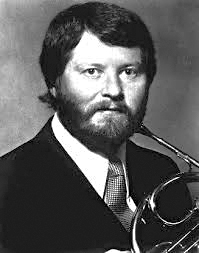
David Krehbiel (1973)
David Krehbiel was leaving Davies Hall in 1998 after just playing his final concert as principal horn of the San Francisco Symphony. He and good friend, principal trombonist, Mark Lawrence were approached by a woman who gushed,‘That’s the greatest horn playing I have ever heard. It was fabulous, just wonderful.’ When Krehbiel thanked her she added, ‘When will you be moving from Montreal?’ She thought he was John Zirbel, Montreal’s principal horn who had just agreed to play in San Francisco after Krehbiel retired. “Mark and I just started laughing like crazy,” says Krehbiel. “It was the perfect end to my career. Where had she been all those years that I had played? Evidently she showed up to hear Zirbel and thought I was him and pretty great. Oh, did we laugh.”
In the beginning
David Krehbiel grew up in Reedley, California. His earliest memories of music come from the First Mennonite Church where his grandfather was the first pastor. His father sang in the choir and his mother played the organ. Music surrounded his upbringing and he has strong memories of falling asleep while Chopin wafted upstairs from his mother’s piano practing. “I remember being absolutely moved by any kind of music. I felt it from a young age.”
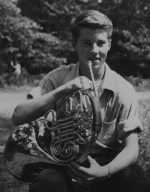
Sixteen year old Krehbiel at Interlochen (1953)
He was studying trumpet in the 8th grade when his parents took him to a concert of the Fresno State Orchestra. Instead of focusing on the trumpet player, he was mezmerized by the sound coming from hornist, Jim Winter. “I was overwhelmed by the sound of the horn. That is what attracted me to it.” It wasn’t long before he switched to the horn and started studying with Jim Winter.
While attending Fresno State a new symphony was being formed. As luck would have it, his teacher was on sabbatical, so he was asked to be the first horn of the new Fresno Philharmonic. “That was scary as hell. I remember playing Pavane by Ravel and getting through it but fainting afterwards. The second horn player was holding me up. I guess I got so nervous that I just passed out.”
After three years in Fresno, Jim Winter encouraged him to go to Northwestern to study with Philip Farkas, the principal horn of the Chicago Symphony.
Krehbiel is dyslectic so he didn’t study scales until he got to Northwestern. He learned in a different way. “I have always loved teaching, mainly because of how I struggled.” He often played unmeasured etudes in his lessons and it was a negotiation. Philip Farkas had an idea of how the pieces should go and how they should be phrased. Krehbiel brought his own ideas to the pieces and tried to convince his teacher through his playing. “As a teacher myself, I have always liked that. To have a student who doesn’t accept my way but has ideas of their own and will negotiate. There is an interchange, not just me telling them what to do. That has always been important to me.”
Achieving the perfect audition attitude
The teacher and student hit it off, and Farkas wanted Krehbiel to be his assistant in the Chicago Symphony. It was a different era when musicians could just be appointed to the orchestra without auditioning. Farkas didn’t want the responsibility on his shoulders so he asked the conductor, Fritz Reiner, to listen to Krehbiel. “I went to his apartment and was very intimidated. I knew that if I missed one note it would be over. Reiner looked like Bela Lugosi [Dracula 1931] and in his scratchy voice said, ‘Play Heldenleben.’” Krehbiel attempted to play the first low note and it didn’t come out. It was a cold winter day and he hadn’t warmed up. At that point Krehbiel figured it was a lost cause so he achieved the perfect relaxed audition attitude.
Farkas had just published his book The Art of French Horn Playing and an autographed copy was on Reiner’s table. ‘Your teacher gave me this book,’ he grumbled. ‘You must loosen the ‘arm-bore-shoore’ (embouchure) for the low notes.’ Krehbiel continued the audition and the second time the low Bb spoke. He was totally relaxed. “I realized afterwards that Reiner probably thought I took direction well. He told me what to do and I fixed it. So they called and offered me the assistant job. I was elated for two days before the terror struck me. I knew I had to get serious about the horn.” Up until then, he had good days and bad days. Farkas had said, ‘Don’t change a thing, kid. You won the job,’ but Krehbiel knew he would never survive if he didn’t learn to play consistently.
“A really good orchestra is like chamber music.”
Fritz Reiner was a big influence in his life. He had a tiny little beat and the attitude of a major general. When things in the orchestra got a little shaky he would simply quit conducting. He just stood there and instantly things would come together because the orchestra was forced to listen to each other; just like chamber music. “Today you see conductors flailing around because they are trained to flog us with the beat. Musicians at our level don’t need beats anymore. We just need to play chamber music.”
Krehbiel learned early on how to lead by example. Other musicians will follow if they see the leader enjoying what they are doing. “You lead by who you are and how you play. You don’t need to tell anyone else what to do. That is a mistake a lot of people make.” Bud Herseth (Principal Trumpet 1948-2001) was that leader in the Chicago. Sitting three feet from his bell was something Krehbiel will never forget. He led the entire orchestra and everyone followed him.
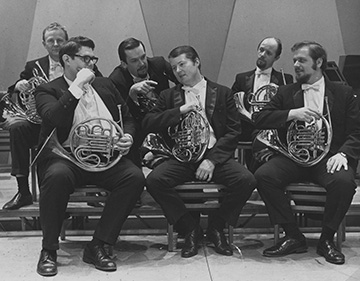
The Detroit Symphony Horn Section circa 1970 (left to right): Willard Darling, Charlie Weaver, Ed Sauve, David Krehbiel, Keith Vernon, Thomas Bacon
Arthur Fiedler came to Chicago to conduct Oberon which starts with a horn solo. It was to be performed on live television at WGN Tribune Towers. Farkas let the 22-year-old Krehbiel play it. It was Krehbiel’s first experience with Fielder. During the short rehearsal before the performance Fiedler stopped in the middle of the horn solo and snarled, ‘No, your C# is flat.’ Krehbiel played it again and was interrupted. ‘No, you’re flat.’ Krehbiel had finally had it and played the C# REALLY SHARP in rehearsal. Even at his young age, Krehbiel somehow knew to honor his instinct, and play the phrase as he thought it should be. During the solo at the performance, he looked up and Fiedler was making faces and gestures about moving the pitch up. “I was so pissed off because this was on television. After the concert I found Farkas downstairs where he had watched the live broadcast. ‘Did you see what that guy did to me,’ I asked him. ‘Oh no kid, the camera was right on you. You were great. You looked great.’”
“The Union has changed dramatically in my lifetime.”
When Krehbiel worked for the Chicago Symphony he was making $145 per week. There were no guarantees and no committees. He had no way to plan his life because schedules were posted one week at a time and Management constantly changed them. “There has been such a change in the union in my lifetime. I have benefited greatly because of the union.” The members of the Chicago Symphony were responsible for starting Senza Sordino [ICSOM newsletter] and they were the first orchestra to have a committee.
While in Chicago, Krehbiel got to play with great conductors like Leopold Stokowski, George Szell, and others. Playing at that level was easier than he expected. “There is so much confidence all around you and people play in tune; everything works. I wasn’t nervous at all.” Farkas left after Krehbiel’s second year and Krehbiel continued to play assistant for the next three years.
In 1962, he was appointed co-principal with Frank Brough. “That worked out great for both of us. The orchestra manager told me that Conductor Fritz Reiner was very happy with the situation and we were going to be co-principals for the next season.” Later Krehbiel found out that a principal had already been engaged for the next year. He couldn’t believe the manager had lied to his face.
This motivated him to find a principal job elsewhere. There were openings in Pittsburgh and Detroit at the time. He auditioned and won both jobs and chose to move to Detroit.
Paul Hindemith conducted one of Krehbiel’s last concerts with the Chicago Symphony, a runout in Milwaukee. Traveling back by train gave Krehbiel the opportunity to seek out his idol to say a few last words to him. (This was a few months before Hindemith’s death.) “I had already signed my contract to go to Detroit but I was still burnt about the orchestra manager lying to me.” Krehbiel found Hindemith sitting at a table next to said manager. He wasn’t going to stop but Hindemith called him over. ‘What are your plans, young man?’ Krehbiel told him he was leaving the orchestra to play principal horn with the Detroit Symphony.
“Hindemith looked across the table at the manager who had lied to me and said, ‘You’re stupid. How could you let this man go?’ Hindemith lit into him on my behalf. Here was my hero defending me to my worst enemy and I had nothing to do with it. I couldn’t have predicted a better scenario.”
The practical joker
The first time Arthur Fiedler spotted David Krehbiel in the Detroit Symphony, he glowered. ‘What are you doing here?’ The orchestra always played a medley of armed services songs at their pops concerts when Fiedler was conducting. Krehbiel got the idea to make paper airplanes and toss them during the Air Force Song (Off We Go into the Wild Blue Yonder). “The first year it was just me throwing a couple paper airplanes but everyone thought it was so funny they decided to join me the next year.” By the third year there were so many people throwing planes that and hardly anyone was left playing. The fourth year, Krehbiel made a stiletto plane, which he had fine-tuned to fly directly over the podium. After most of the planes had cleared, he stood up, aimed and shot the plane right by Fiedler’s head. It barely missed him before soaring into the audience. “Needless to say, we never played that piece again.”
Krehbiel dreamt of returning to California. He had grown up in a small town and wasn’t a city person. “The only reason I lived in big cities was to play in orchestras.” After 9 years in Detroit, his opportunity finally came when Bill Sabatini, principal horn of the San Francisco Symphony (SFS) stepped down.
Times had changed and conductors could no longer hire musicians without an audition. Candidates had to play for an audition committee. It had been a long time since Krehbiel had taken an audition. Concurrently the Boston Symphony had a principal horn opening, so he decided it would be good practice to audition for both. In Boston he tied with Charles (Chuck) Kavalovski and the Boston Symphony asked them each to return and play a week before they chose a winner.
In the meantime, SFS held their audition and it so happened that Chuck Kavalovski auditioned too. “I had a premonition that I was going to be the new first horn so when we were sitting backstage at the Opera House waiting for the results, I was shocked when they asked to talk to Chuck first.” The Symphony contract required the winner of the audition to accept or deny the offer on the spot at the salary advertised. Kavalovski told them he was being considered for principal horn in the Boston Symphony therefore he couldn’t accept. As he passed Krehbiel in the hall he said, “Why don’t you just stay out of my life?” Krehbiel was shocked that Kavalovski hadn’t taken the job. When SFS made him the same offer he said, “Where do I sign?”
He and Kavalovski have since become good friends. “Chuck was one of those people that always had to do his routine and practice daily, whereas I could quit for a week and pick the horn right back up. I feel sorry for people who are married to the horn and have to carry it around wherever they go. I was never addicted to the horn; certainly never addicted to practicing. I was always interested in freedom from that.”
San Francisco Symphony
Originally Krehbiel split the first horn book with Herman Dorfmann. “We used to flip a coin to see who would get to play which half. Hermann swore I had a two headed coin because I always got the juicy stuff.”
One of Krehbiel’s biggest fears was being asked to play something he hadn’t looked at, like sight reading in some strange key. “Give me enough time and I could learn it. That’s why it was a blessing when Bob Ward got into the orchestra. He could read anything, never had to take it home. He would just nail it at the first rehearsal. So it was a perfect match for me to have Bob there because he didn’t mind playing all the modern stuff while I got to play the touchy Mozart pieces.”
“I have been an adrenaline junkie my whole life. I would rather be scared to death than bored to death. I get bored pretty easily. I look back now and wonder how the hell did I do that?”
Seiji Ozawa was conducting Haydn Symphony #51 which has a high written F above the highest C. Krehbiel was trying to figure out how to get the note out. “I just couldn’t play that high but I finally figured out that I could sing the note through the horn and it sounded like I played it.” Right before the first rehearsal Ozawa came by the horn section and ask Krehbiel if he could play the high notes. “He was standing right next to me. I played the phrase and sang the high note and he smiled and said, ‘Ah, very good.’ So I sang it for every concert. Sure dumb luck that I was able to do it.”
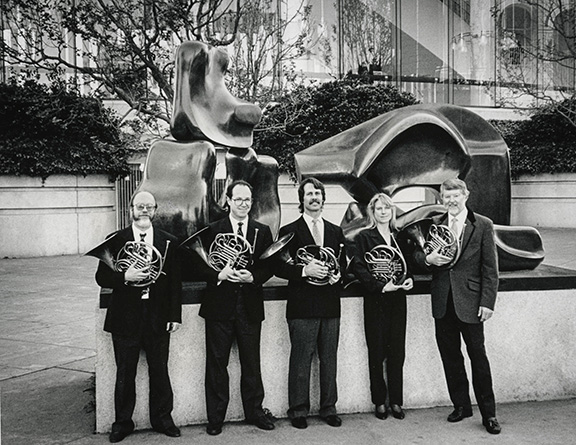
The San Francisco Symphony Horn Section circa 1997 (left to right): Robert Ward, Jonathan Ring, Bruce Roberts, Lori Westin, David Krehbiel
One of Krehbiel’s scariest moments as a horn player was being in the percussion section. It was an open rehearsal with Ozawa conducting Berlioz’s Symphonie Fantastique and a percussionist was missing. Krehbiel wasn’t scheduled to play the horn so they asked if he would play the bells. “I enthusiastically agreed. Up until that point I thought those percussion guys had it easy. They just sit around and play one note.” As Krehbiel waited for his big moment, he felt the pressure of everyone looking at him. “Ozawa gave me a great big cue and I played at the right time but it really changed my view of what those guys go through.”
The pranks continue
Krehbiel’s history with the accordion started when the SF City Council considered making it their official instrument. NBC news came to Davies Hall to interview symphony members about how they were taking this news. When asked, Krehbiel responded, “I am going to start a bumper sticker campaign: Use an accordion, go to jail. Furthermore the definition of a gentleman is someone who knows how to play the accordion but chooses not to.” It didn’t end there because the news story got picked up across the country. Barbara Butler (trumpet) from Chicago saw the clip and hired an actor to call Krehbiel, claiming to be from the Wisconsin Accordion Anti-Defamation League. “Even my mother saw it and said ‘Don’t you know your uncles play the accordion?’”
The accordion gag followed him beyond retirement. Krehbiel sat in on his replacement’s audition, behind the screen and as a non-voting member. After a long day of listening to horn candidates, the last person was announced and proceeded to play the horn excerpts on the accordion. “Bob [Ward] and the guys really got me good.”
His most memorable prank happened during a rehearsal of Stravinsky’s Fairy’s Kiss. At the end of rehearsal, Krehbiel stood up and called the trombones to task for being too loud. Principal trombonist, Mark Lawrence, tried to calm Krehbiel down but he was in on the joke. He had swapped out his instrument for one purchased at the flea market. “No, I am really upset. You are too loud,” Krehbiel said. By now the violas was egging him on. He grabbed Lawrence’s trombone and started a tug of war. “I threw it down on the floor and jumped on it and stormed off the stage to the cheers of the viola section. At least half the people thought it was for real. Funny thing is, afterwards when I would walk by someone backstage, they would clutch their instrument a little closer so I couldn’t grab it. I was famous for that one. I acted out the perfect revenge dream.”
“I don’t know if it’s in my DNA or being surrounded by music growing up, but I feel music on a different level. Music is a powerful tool to express things that you can’t always touch and feel.”
Krehbiel hears music in a different way now that he is not playing. He wonders how things are possible. It was much easier when he was playing. “My whole life has been about finding a way to play without stressing out; to make it easier and natural. I fearlessly walked through stuff that I couldn’t possibly do now.” He hasn’t played for 18 years but still looks back at the opportunities that fell into his lap. “I have had a truly charmed life.”
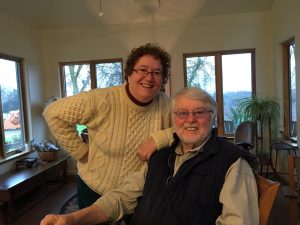
Beth Zare: I studied with Dave Krehbiel my senior year in high school. Davies Hall had just been built when my family moved to California. I got to listen to Dave in my formative years. Then I had the opportunity to play with the San Francisco Youth Orchestra during its inaugural season. That is when I started studying with Dave. What I remember most was when he said, “Don’t practice too much. You don’t want to be a horn geek.”
